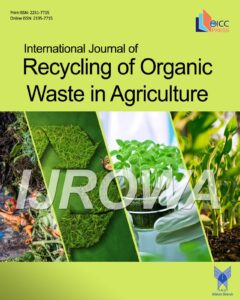Agro-environmental assessment of composting plants in Southwestern of Morocco (Souss-Massa Region)
Authors
-
Khalid Azim
*
 1
1
- S. Komenane 2
- B. Soudi 2
Abstract
Purpose The region of Souss-Massa generates huge quantities of organic horticultural wastes estimated up to 1,307,465 tonsyear-1 . Fruit and vegetable producers are asked to process the organic wastes because of the GlobalGAP certification requirements. As a result, there is a need to assess the existing composting plants at regional scale, to improve their efficiency, produce a high-quality soil amendment, free from any pathogens, and weed seeds. Methods The survey consisted of a diagnosis of the quantitative and qualitative status of the organic horticultural wastes (axillary buds; pruned leaves), and an agroenvironmental assessment of nine composting units. Results The analysis of macronutrients (nitrogen, phosphorus, and potassium) in the organic wastes reveals that 13 million euro worth of N, P, and K can be generated by composting all horticultural wastes (12,000 tons of nitrogen, 6000 tons of phosphorus and 14,000 tons of potassium year-1 ), constituting for soils an important source of fertilization backup. Results of field investigations showed that 55% of the composting plants have an area equal to one hectare. The proximity between mature piles and raw materials in 55.5% of cases could highly contaminate them by root knot nematode inoculum. Only 11% of composting units were operating on impermeable surface. The test of circular chromatography showed that 80% of sampled composts are immature, even with high operational costs. Conclusion Much effort is required to control and optimize the maturation process. The composting activity should be organized through a professional skilled organization, supported by scientific research and government subsidies.



